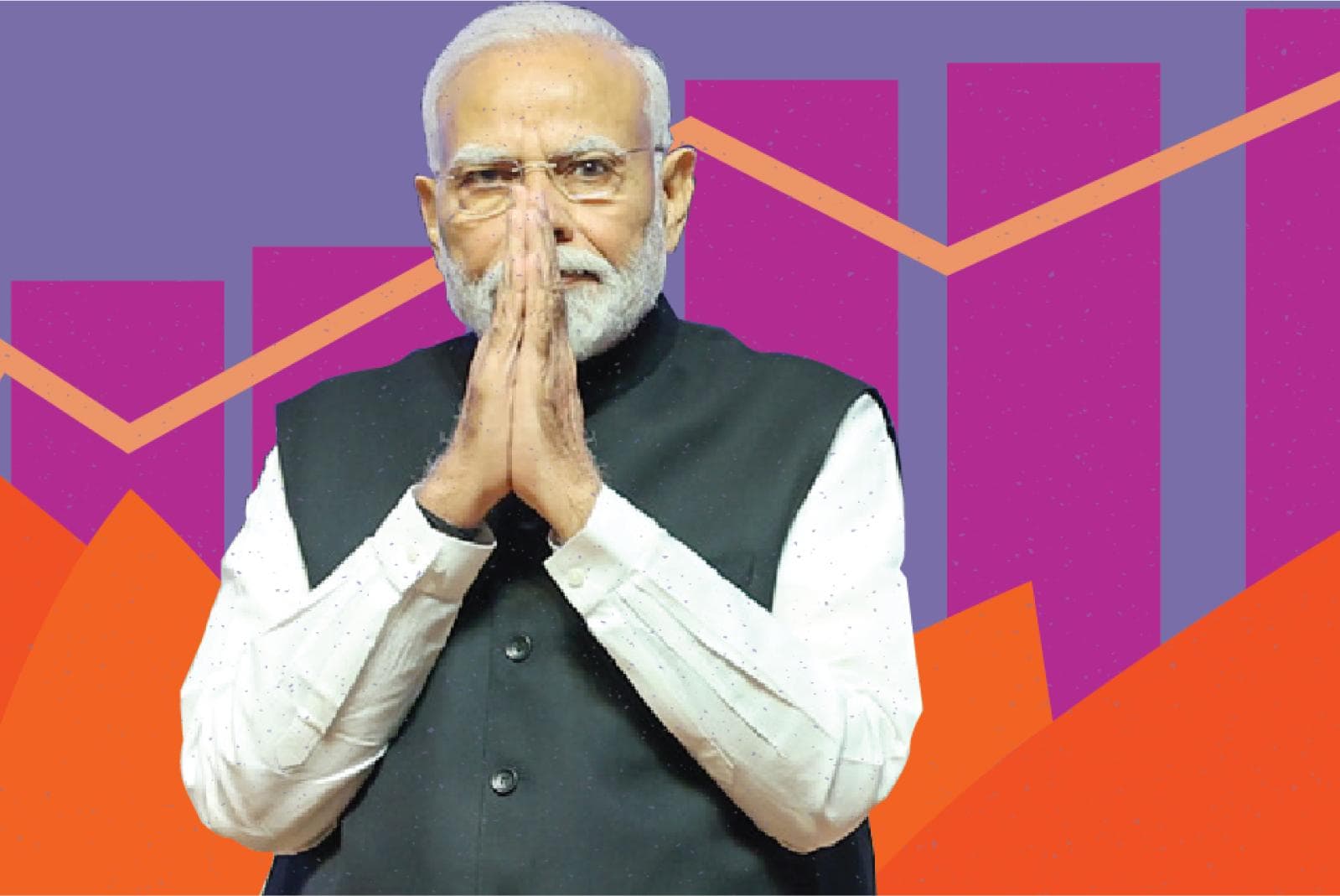Unlocking change through consensus
Narendra Modi's visionary leadership inspires the collaborative spirit of SDG 17

In the interconnected world of the 21st century, bridging divides, fostering collaboration, and building consensus have become vital to achieving systemic change. Central to this dynamic has been India’s leadership, notably under Prime Minister Narendra Modi, and pioneering organizations such as the Bridge Institute. Together, their approach demonstrates how collaborative efforts can reshape societies, integrating government, business, and civil society.
Narendra Modi’s Leadership Paradigm
Celebrating 22 years in public service, Narendra Modi's journey has been emblematic of transformative leadership. His innate quality, often overshadowed by his numerous achievements, is his potent aptitude for consensus-building.
- One World, One Family, One Future: Modi's global approach, as seen in the G20 Summit, emphasizes diminishing global divisions. His commitment to boosting representation from the Global South showcases his dedication to creating a balanced world stage. The creation of the India-Middle East-Europe Corridor is a testament to this, marking India's diplomatic foresight and assertive international posture.
- National Cohesion: On the domestic front, Modi’s initiatives highlight his commitment to addressing long-standing issues. The landmark resolution of the India-Bangladesh Land Boundary Agreement stands as a testament. His drive to unify India’s tax regime through the Goods and Services Tax reform, backed by extensive consultations, signifies his dedication to a collective approach.
- Societal Harmony: Modi's leadership also extends to fostering domestic tranquillity. From the Bodo Accord, which marked the end of a five-decade-long unrest in Assam, to the Assam-Meghalaya Inter-State Boundary Agreement, Modi's strategy has always revolved around dialogue, consensus, and genuine commitment to peace.
- Minimum Government, Maximum Governance: Modi aims to foster a streamlined and efficient administrative system that prioritizes the well-being and ease of living for its citizens. This vision materialized through actions like the elimination of roughly 1600 obsolete laws, reflecting trust in the country's youth and the decision to remove interviews for government roles, promoting fairness while reducing state expenses. His modern governance model has embraced digital innovation, with e-governance enhancing citizen participation. Open Digital Platforms have further bolstered this digital transformation, enabling universally compatible technology solutions that catalyze impactful campaigns, ranging from backlog reductions to cleanliness drives.
Bridge Institute: Complementing Modi’s Vision with Pioneering Initiatives
At the Bridge Institute, the ethos is parallel to and inspired by Modi's approach, recognizing that challenges of fostering positive societal transformation demands an approach that transcends traditional silos. The Institute, while maintaining its neutrality, has become a hub for converging minds, working jointly to strategize and implement solutions. It's heartening to see the Government of India rising to the occasion, adopting a holistic strategy that seamlessly merges government, business, and civil society to bring about impactful change.
A Holistic Approach to Societal Challenges at the Bridge Institute
At the Bridge Institute, our philosophy revolves around the understanding that the world's paramount challenges, whether it's climate change, social equality, or humanitarian crises, cannot be addressed in isolation. They are systemic in nature, intertwined in a web of causes and effects. Tackling them head-on means orchestrating a coordinated response, where every stakeholder contributes to a harmonized solution.
For over a decade and a half, our role has been that of a catalyst. We convene influential leaders from diverse sectors to jointly brainstorm, strategize, and implement solutions to pressing societal challenges. Our mission has always been clear: to foster ground-breaking ideation, chart out detailed plans for tangible solutions, and monitor their successful execution. Amidst this, our commitment to maintaining neutrality ensures that our collaborations remain productive and free from bias.
While our efforts were sown in the Indian subcontinent, they have now borne fruit in various parts of the world, including the Philippines, the United Kingdom, Singapore, Malaysia, and the Middle East.
Diving Deeper: Impactful Initiatives in India
- Revitalizing Jammu & Kashmir: Since 2014, our alliance with the Government of Jammu & Kashmir has been a beacon of hope for the region. We curated a platform that brought together a diverse spectrum of thought leaders, including government officials, law enforcement, educators, NGOs, media personalities, and more. Through this collaborative effort, over 260 societal leaders have been revitalized, drawing inspiration and fresh perspectives, ultimately leading to actionable solutions for Kashmir’s socio-economic challenges. In line with this vision, the "Mission Youth" program, spearheaded by Lieutenant Governor Manoj Sinha, received the distinguished 'Prime Minister's Award for Excellence in Public Administration' presented by Prime Minister Narendra Modi. Celebrated for its pivotal role in uplifting the youth of Jammu and Kashmir, the initiative has championed education, skill development, coaching, volunteer opportunities, and technological advancements. Having positively influenced over 61,000 young individuals directly and engaging close to 500,000 in just two years, the program offers a wide array of services, from preparatory coaching for exams to emotional support and unique livelihood programs.
- Transforming Odisha: Odisha's Chief Minister, Naveen Patnaik, demonstrates an unmatched commitment to gender equality. His support for the Kalinga Fellowship and emphasis on women's empowerment in Odisha being a genuine movement and not just a catchphrase is notable. He has also highlighted the significant role technology plays in bridging gender disparities in various sectors. In line with this commitment, our efforts to combat gender-based violence have found a guiding star in the Kalinga Fellowship. In collaboration with the Government of Odisha and hosted at the esteemed Kalinga Institute of Social Sciences (KISS), the initiative received unparalleled support from its founder, Dr. Achyuta Samanta. Assembling a cohort of influential leaders, one of the fellowship's crowning achievements was a campaign initiated by an educational stalwart that mobilized 140,000 students. Their grassroots efforts, which included actions against child marriages and human trafficking, culminated in an impressive 280,000 community-driven projects within just two years.
- Empowering Kerala: Kerala, renowned for its high literacy and advocacy for gender-equality, led a national campaign against child marriage. The Bridge Institute galvanized a unique partnership with local communities, student police cadets (SPC), and law enforcement agencies. These cadets, serving as ambassadors of change, traversed from one village to another, emphasizing the repercussions of child marriage. Through targeted community engagements, they secured pledges from residents, ensuring that child marriage becomes a relic of the past.
In Reflection
The synergy of collective action is a force to reckon with. As the Bridge Institute, our experience in India stands testament to this. Our endeavours, backed by the proactive approach of both the central and state governments, have set the foundation for a systemic approach to societal reforms.
In acknowledging the strides made, it's imperative that we recognize and laud the Government of India's audacious and visionary stance in enabling such epoch-making transformations.
The world today, more than ever, requires leaders and institutions that prioritize dialogue, consensus-building, and collaboration. The harmonious alignment of Prime Minister Narendra Modi’s leadership and the initiatives of the Bridge Institute encapsulate this spirit. Both entities, in their respective capacities, emphasize inclusion, genuine dialogue, and collective action.
In recognizing these strides, it becomes evident that the Government of India, under Narendra Modi’s visionary leadership, has redefined the path towards achieving systemic change. As the world continues to grapple with multifaceted challenges, such leadership serves as a beacon, reminding us of the ethos of "Vasudhaiva Kutumbakam" - the world is one family.



































